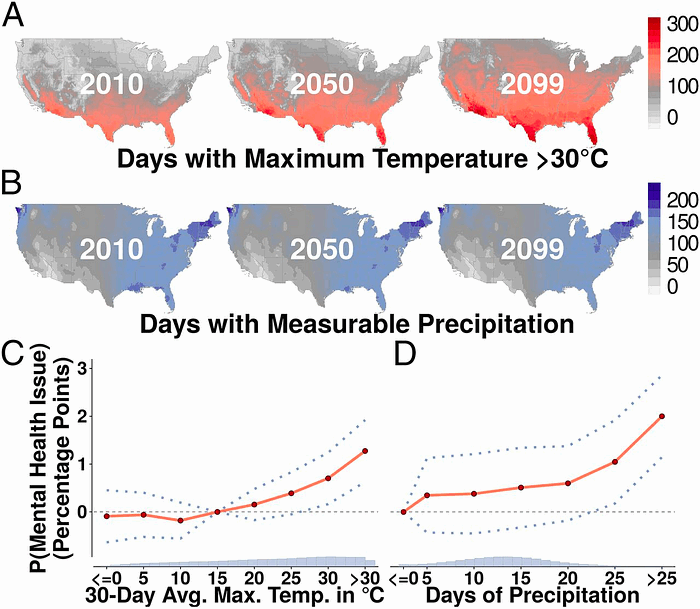Across the USA and Europe, hundreds of millions of people have endured heat wave after heat wave this summer. Even new national records were shattered. While we all know that heat waves significantly affect our physical health, a scientific study shows that extreme heat and humidity are both physically and mentally stressful.
Dr. Nick Obradovich is a computational social scientist at the Max Planck Institute for Human Development and a co-author of a 2018 paper on climate change’s mental health concerns. In his discussions with NY Times, he said heat extremes are harmful across the board.
Rising temperatures are linked to mental health disorders like exhaustion, aggressiveness, and suicide. However, Dr. Obradovich noted that this link isn’t restricted to temperature surges – it’s also prevalent in areas where it’s constantly hot.
Scientists don’t know why or if heat causes brain alterations that cause these consequences. However, heat is linked to worse mental health, researchers believe.
Research findings
According to Dr. Obradovich, temperature extremes can affect your day-to-day mood and your risk of a mental health crisis. For example, a study published in JAMA Psychiatry (Association Between Ambient Heat and Risk of Emergency Department Visits for Mental Health Among US Adults, 2010 to 2019) examined the medical data of more than 2.2 million persons who visited emergency rooms 3.5 million times from 2010 to 2019.
There were 8% more mental health ER visits on the hottest summer days than on the coolest. Self-harm, substance use, anxiety, mood, and schizophrenia emergency visits also rose with temperature. This tendency is “fairly similar for men and women, individuals of all ages, and people living in all parts of the U.S.,” said Dr. Amruta Nori-Sarma to NY Times.
Higher temperatures may promote bipolar relapses, while more sunlight may cause manic episodes, also. Higher temperatures have also been linked to mental health fatalities.
On days when temperatures are above 70 °F / 21 °C, almost 2 million Americans reported less joy, happiness, tension, anger, and exhaustion than those days with temperatures between 50 °F / 10 °C and 60 °F / 16 °C degrees. The scientists noted that these connections were strongest above 90 °F / 32 °C.

How’s our body reacting?
C. Munro Cullum, a clinical neuropsychologist from Dallas working at UT Southwestern Medical Center, says, “When we’re uncomfortable, we’re not at our best.” Heat discomfort and the energy needed to cool down can reduce resilience. In addition, he noted that it makes agitation, annoyance, and pain worse.
Dr. Martin Paulus, who serves as a president of the Laureate Institute for Brain Research in Tulsa, Oklahoma, partnered with Dr. Obradovich on his 2018 study. He said that maintaining body temperature during a heat wave causes stress and inflammation. Mental health disorders may be exacerbated by heat stress, he noted. He emphasizes that it’s difficult to investigate what happens in the brain during intense heat. You can study how the brain and body handle a few minutes or hours of high temperatures in a laboratory, but you can’t perform that for days or months. Yet, those longer exposures are vital for comprehending how changing climate may affect us long-term.
Dr. Nori-Sarma says the constant correlation between heat and mental health implies that heat affects the brain. Heat may induce a brain signaling imbalance or inflammation and can interrupt sleep, worsening mental health issues. Dr. Obradovich commented on a well-known fact – warm evenings hinder sleep. According to psychology and psychiatry research, insufficient sleep and sleep problems, in general, are connected to worse mental health over time, and Dr. Obradovich believes that a mixture of these hypotheses might explain heat’s influence on mental health.
Other factors and eco-anxiety
Dr. Paulus also mentioned climate anxiety. Climate warming increases the frequency and severity of wildfires and heat waves. In addition, as global warming develops, eco-anxiety may intensify stress, anxiety, depression, or disaster-related PTSD symptoms. The 2018 study mentioned earlier showed that those with lower incomes and women faced harsher mental health consequences from heat. For example, low-income women were twice as affected by heat as high-income males.
In a heat wave, protecting yourself is crucial. Being conscious of heat exposure, staying hydrated, and avoiding heat are important choices. Also, be mindful of your family members who might need assistance, neighbors, and pets!
ABOUT THE AUTHOR












